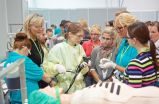Reading a biological clock in the dark
Proper coordination between our gut bacteria and our biological clocks may be crucial for preventing obesity and glucose intolerance
2014-10-21
(Press-News.org) Our species' waking and sleeping cycles – shaped in millions of years of evolution – have been turned upside down within a single century with the advent of electric lighting and airplanes. As a result, millions of people regularly disrupt their biological clocks – for example, shift workers and frequent flyers – and these have been known to be at high risk for such common metabolic diseases as obesity, diabetes and heart disease. A new study published in Cell, led by Weizmann Institute scientists, reveals for the first time that our biological clocks work in tandem with the populations of bacteria residing in our intestines, and that these microorganisms vary their activities over the course of the day. The findings show that mice and humans with disrupted daily wake-sleep patterns exhibit changes in the composition and function of their gut bacteria, thereby increasing their risk for obesity and glucose intolerance.
A consensus has been growing in recent years that the populations of microbes living in and on our bodies function as an extra "organ" that has wide-ranging impacts on our health. Christoph Thaiss, a research student in the lab of Dr. Eran Elinav of the Weizmann Institute's Immunology Department, led this research into the daily cycles of gut bacteria. Working together with David Zeevi in the lab of Prof. Eran Segal of the Computer Science and Applied Mathematics Department, and Maayan Levy of Elinav's lab, he found a regular day-night cycle in both the composition and the function of certain populations of gut bacteria in mice. Despite living in the total darkness of the digestive system, the gut microbes were able to time their activity to the mouse's feeding cycles, coordinating daily microbial activities to those of their host.
Does this finding have any medical significance? To further investigate, the researchers looked at "jet-lagged" mice, whose day-night rhythms were altered by exposing them to light and dark at different intervals. The jet-lagged mice stopped eating at regular times, and this interrupted the cyclic rhythms of their internal bacteria, leading to weight gain and high blood sugar levels. To verify these results, the scientists transferred bacteria from the jet-lagged mice into sterile mice; those receiving the "jet-lagged microbes" also gained weight and developed high blood sugar levels.
The research group then turned to human gut bacteria, identifying a similar daily shift in their microbial populations and function. To conduct a jet-lag experiment in humans, the researchers collected bacterial samples from two people flying from the US to Israel – once before the flight, once a day after landing when jet lag was at its peak, and once two weeks later when the jet lag had worn off. The researchers then implanted these bacteria into sterile mice. Mice receiving the jet-lagged humans' bacteria exhibited significant weight gain and high blood sugar levels, while mice getting bacteria from either before or after the jet lag had worn off did not. These results suggest that the long-term disruption of the biological clock leads to a disturbance in their bacteria's function that may, in turn, increase the risk for such common conditions as obesity and imbalances in blood sugar levels.
Segal: "Our gut bacteria's ability to coordinate their functions with our biological clock demonstrates, once again, the ties that bind us to our bacterial population and the fact that disturbances in these ties can have consequences for our health."
Elinav: "Our inner microbial rhythm represents a new therapeutic target that may be exploited in future studies to normalize the microbiota in people whose life style involves frequent alterations in sleep patterns, hopefully to reduce or even prevent their risk of developing obesity and its complications."
INFORMATION:
Also participating in this research were Gili Zilberman-Schapira, Jotham Suez, Anouk Tengeler, Lior Abramson, Meirav Katz and Dr. Hagit Shapiro in Elinav's lab; Tal Korem in Segal's lab; Prof. Alon Harmelin, Dr. Yael Kuperman and Dr. Inbal Biton of the Veterinary Resources Department, Dr. Shlomit Gilad of the Nancy and Stephen Grand Israel National Center for Personalized Medicine; and Prof. Zamir Halpern and Dr. Niv Zmora of the Sourasky Medical Center and Tel Aviv University.
Dr. Eran Elinav's research is supported by the Abisch Frenkel Foundation for the Promotion of Life Sciences; the Benoziyo Endowment Fund for the Advancement of Science; the Gurwin Family Fund for Scientific Research; the Leona M. and Harry B. Helmsley Charitable Trust; the Adelis Foundation; Yael and Rami Ungar, Israel; the Crown Endowment Fund for Immunological Research; John L. and Vera Schwartz, Pacific Palisades, CA; the Rising Tide Foundation; Alan Markovitz, Canada; Cynthia Adelson, Canada; the estate of Jack Gitlitz; the estate of Lydia Hershkovich; the European Research Council; CNRS - Centre National de la Recherche Scientifique; the estate of Samuel and Alwyn J. Weber; and Mr. and Mrs. Donald L. Schwarz, Sherman Oaks, CA. Dr. Elinav is the Incumbent of the Rina Gudinski Career Development Chair.
Prof. Eran Segal's research is supported by the Kahn Family Research Center for Systems Biology of the Human Cell; the Cecil and Hilda Lewis Charitable Trust; the European Research Council; and Mr. and Mrs. Donald L. Schwarz, Sherman Oaks, CA.
The Weizmann Institute of Science in Rehovot, Israel, is one of the world's top-ranking multidisciplinary research institutions. Noted for its wide-ranging exploration of the natural and exact sciences, the Institute is home to scientists, students, technicians and supporting staff. Institute research efforts include the search for new ways of fighting disease and hunger, examining leading questions in mathematics and computer science, probing the physics of matter and the universe, creating novel materials and developing new strategies for protecting the environment.
Weizmann Institute news releases are posted on the World Wide Web at http://wis-wander.weizmann.ac.il, and are also available at http://www.eurekalert.org.
ELSE PRESS RELEASES FROM THIS DATE:
2014-10-21
Bethesda, MD (Oct. 21, 2014) — If you are not getting the recommended seven-to-eight hours of sleep each night, you may be at increased risk of developing ulcerative colitis, according to a new study1 in Clinical Gastroenterology and Hepatology, the official clinical practice journal of the American Gastroenterological Association.
"Both short and long durations of sleep have important health implications and are associated with increased overall mortality, cardiovascular disease and cancer," said lead study author Ashwin N. Ananthakrishnan, MD, MPH, Massachusetts ...
2014-10-21
A team of UC San Francisco researchers has found that a tiny segment of genetic material known as a microRNA plays a central role in the transition from moderate drinking to binge drinking and other alcohol use disorders.
Previous research in the UCSF laboratory of Dorit Ron, PhD, Endowed Chair of Cell Biology of Addiction in Neurology, has demonstrated that the level of a protein known as brain-derived neurotrophic factor, or BDNF, is increased in the brain when alcohol consumed in moderation. In turn, experiments in Ron's lab have shown, BDNF prevents the development ...
2014-10-21
(Vienna, October 21, 2014) Patients with irritable bowel syndrome (IBS) may at last be able to hope for a brighter future as innovative new treatments emerge and researchers clarify the role of current therapies. Dr Alexander C. Ford from the Leeds Gastroenterology Institute in Leeds, UK, tells journalists attending the 22nd United European Gastroenterology Week (UEG Week 2014) in Vienna, Austria, that significant progress was being made in drug development for IBS, thanks to the intense research efforts of scientists around the world. "Researchers have dedicated many years ...
2014-10-21
A new study shows that survival and neurological outcomes for patients in cardiac arrest can be improved by adding extracorporeal membrane oxygenation (ECMO) when performing cardiopulmonary resuscitation (CPR). The study abstract was released today in an online supplement of the journal CHEST and will be presented at CHEST 2014, the annual meeting of the American College of Chest Physicians in Austin, Texas held October 25-30.
Despite advances in medical care, less than 20% of people who experience a cardiac arrest make a full recovery. An alternate approach to traditional ...
2014-10-21
PROVIDENCE, R.I. [Brown University] — Scientists think of CD8 T cells as long-lived cells that become tuned to fight just one pathogen, but a new study finds that once CD8 T cells fight one pathogen, they also join the body's "innate" immune system, ready to answer the calls of the cytokine signals that are set off by a wide variety of infections.
Think of CD8 T cells as soldiers who are drafted and trained for a specific mission, but who stay in service, fighting a variety of enemies throughout a long career.
CD8 T cells therefore have more utility than researchers ...
2014-10-21
Eliminating subsidies that help low- and moderate-income people purchase coverage through government-run health insurance marketplaces would sharply boost costs for consumers and cause more than 11 million Americans to lose their health insurance, according to a new RAND Corporation study.
Modeling the likely effects of ending subsidies offered to individuals under the federal Affordable Care Act, researchers found that such a move would increase premium costs in the individual marketplaces by as much as 43 percent and cause enrollment to drop by 68 percent.
"If subsidies ...
2014-10-21
Two Michigan high school students, sisters Ilina and Medha Krishen, have developed screening tools using electronic stethoscopes to detect lung and heart disease. The sisters will present their findings at CHEST 2014 in Austin, Texas next week.
Ilina Krishen became aware of the dangers of smoking and chemical air pollution when she saw the effects of lung disease on family members. Curious to find a way to detect early lung damage in people exposed to noxious air pollutants, Ilina, a high school senior at Port Huron Northern High School in Michigan, developed a screening ...
2014-10-21
Adults typically believe that life gets better — today is better than yesterday was and tomorrow will be even better than today. A new study shows that even depressed individuals believe in a brighter future, but this optimistic belief may not lead to better outcomes. The findings are published in Clinical Psychological Science, a journal of the Association for Psychological Science.
The research shows that middle-aged adults who had a history of depression tended to evaluate their past and current lives in more negative terms than did adults without depression, ...
2014-10-21
TORONTO, Oct. 21, 2014--Controlling the Ebola virus outbreak at the source in West Africa is the most effective way to decrease international risk of transmission, according to a research paper published today in The Lancet.
If the epidemic persists and grows, it's likely there will be more cases of the deadly virus exported to other countries, including Canada, via air travel, said Dr. Kamran Khan, a physician and researcher at St. Michael's Hospital.
Dr. Khan, who examines global airline travel patterns to predict the spread of diseases, said that every month, three ...
2014-10-21
VIDEO:
In this video, a Salk researcher explains how cancer evolves to become drug resistant.
Click here for more information.
LA JOLLA—Like a colony of bacteria or species of animals, cancer cells within a tumor must evolve to survive. A dose of chemotherapy may kill hundreds of thousands of cancer cells, for example, but a single cell with a unique mutation can survive and quickly generate a new batch of drug-resistant cells, making cancer hard to combat.
Now, scientists ...
LAST 30 PRESS RELEASES:
[Press-News.org] Reading a biological clock in the dark
Proper coordination between our gut bacteria and our biological clocks may be crucial for preventing obesity and glucose intolerance




